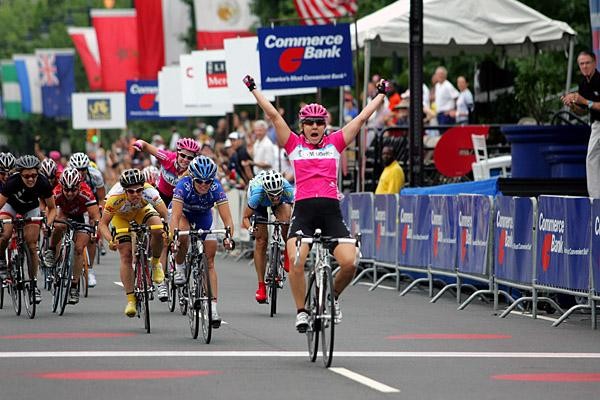Women's North American racing improves for 2008
By Mark Zalewski, North American Editor North American UCI races are one of the more volatile...


By Mark Zalewski, North American Editor
North American UCI races are one of the more volatile aspects of the racing calendar; every year some are added and some disappear. UCI races are more complicated to put on and have significantly higher costs due to more regulations, bigger prize lists and a host of other differences. Despite this fact, the 2008 calendar for women is looking healthier than ever. Cyclingnews already looked at the gentlemen's side of the 2008 calendar, and now turns equal attention to the ladies.
Women road racers historically have had fewer opportunities for the high caliber racing a UCI event provides than their male counterparts, and recently this has been even more the case on the North American continent. But after several years of stagnation, the 2008 calendar finally shows an increase top notch races on this side of the pond. Joining races such as the Liberty Classic and Le Tour du Grand Montréal in early June is the Mt. Hood Cycling Classic, which upgraded only its pro women category to UCI status. Race director Chad Sperry, has also successfully directed the other Oregon race, the Cascade Classic. That race ran into problems with the women's category last year when it fell on the same weekend as the U.S. national championships.
Sperry said that he hopes the Mt. Hood upgrade will help promote women's cycling in general, as well as the Oregon races. "Frankly, we'll never be a Tour of California, but the core group here has always wanted to help women's cycling. And there are so few UCI opportunities in the U.S. compared to the men. We had a huge UCI stage race in the women's challenge in Idaho [from 1984-2002 -ed.] and we wanted to get something similar to that. It's been a model for us, except we have kept the pro men's field intact, partly for the media and financial backing."
"We are increasing the prize list by more than double, but the big thing is being on the UCI calendar," said Sperry. "It was a big leap for us." The race is also increasing its potential spectator and viewership, moving two stages to downtown Portland. "The prologue will be right downtown along the Willamette River starting around 4:00 p.m. on the Tuesday," said Trey Smith, director of public relations.
"Then we are doing a crit on Wednesday during the day about a mile outside of downtown, about 1.5 miles with a nice little elevation gain in it. It should be a good, fun course. The city of Portland has been hugely supportive of us in this endeavor. We are going to be televised on Comcast regional, and I just read we will be on the Verizon network."
Sperry said that the biggest challenge in upgrading to UCI status would be competing with races in Europe. "The one thing I think we will struggle with in terms of Europe is we are in competition with Tour de l'Aude. So we are probably going to see more Oceania and Canadian teams, and of course all the U.S. teams. I think some European teams will wait to see if they get the invite for Tour de l'Aude."
Get The Leadout Newsletter
The latest race content, interviews, features, reviews and expert buying guides, direct to your inbox!
Nobody puts Baby in the corner
Starting the year off in mid-March is the Sequoia Cycling Classic, which is not going UCI in 2008 but is highlighting the ladies by only being on the National Racing Calendar for women. Race director Sheri Clark said that the impetus behind the decision was a combination of adhering to NRC minimum prize requirements while still offering equal opportunities for women. When the race could not afford to do both, it erred on the side of keeping the women as the featured race in lieu of the usual mentality by promoters to give the men top honors.
"The increase in minimum prize requirements forced us to make a decision," said Clark. "Last year we had equal payout for men and women and we wanted to maintain that equity. The main issue is that we have an early race, so when we put our bid applications in the fall, we have to think about if we can raise the extra funds. And we didn't want to make a commitment that we wouldn't be able to fulfill."
"We want the women to understand that we see them as just as important to cycling in North American as the men. Last year we were well appreciated for having equal prize pay out, and the last thing we wanted to do was the common decision to push the women aside. We will still have pro men, but it will be half the prize list."
Read the complete feature.